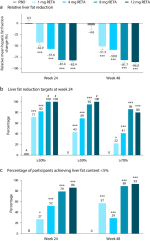keangkong
GLP-1 Specialist
- Member Since
- Sep 2, 2024
- Posts
- 1,979
- Likes Received
- 5,281
Does anyone know what my ultrasound from today shows? I don't see the endocrinologist until Friday of next week. This is what the radiologist wrote:
US Abdomen Complete
REASON FOR EXAM: Metabolic dysfunction-associated steatotic liver disease (MASLD)
COMPARISON: None
TECHNIQUE: Transabdominal imaging with grayscale, color Doppler and duplex evaluation.
FINDINGS:
Liver: Liver is normal in size. Liver parenchyma is diffusely increased in echogenicity. Smooth surface contour. No solid liver mass. Main portal vein is patent with appropriate direction flow.
Gallbladder: Gallbladder is normal in size without stones or sludge. No wall thickening. No pericholecystic fluid. Sonographic Murphy's sign is negative. No intrahepatic bile duct dilation.
Pancreas: Visualized pancreatic head and neck are normal in echogenicity.
Kidneys: Kidneys are normal in size and echogenicity. No hydronephrosis. No solid mass.
Aorta/ IVC: Normal in size without aneurysm.
Spleen: Normal in size and echogenicity.
Other: No ascites.
Measurements:
Liver Size: 16.8 cm
Spleen Size (greatest dimension): 11.0 cm
CBD: 2 mm
Right Kidney: 11.7 x 6.5 x 6.2 cm
Left Kidney: 11.9 x 7.7 x 5.7 cm
IMPRESSION:
1. Hepatic steatosis.
2. Otherwise no acute process identified in the imaged abdomen.
US Abdomen Complete
REASON FOR EXAM: Metabolic dysfunction-associated steatotic liver disease (MASLD)
COMPARISON: None
TECHNIQUE: Transabdominal imaging with grayscale, color Doppler and duplex evaluation.
FINDINGS:
Liver: Liver is normal in size. Liver parenchyma is diffusely increased in echogenicity. Smooth surface contour. No solid liver mass. Main portal vein is patent with appropriate direction flow.
Gallbladder: Gallbladder is normal in size without stones or sludge. No wall thickening. No pericholecystic fluid. Sonographic Murphy's sign is negative. No intrahepatic bile duct dilation.
Pancreas: Visualized pancreatic head and neck are normal in echogenicity.
Kidneys: Kidneys are normal in size and echogenicity. No hydronephrosis. No solid mass.
Aorta/ IVC: Normal in size without aneurysm.
Spleen: Normal in size and echogenicity.
Other: No ascites.
Measurements:
Liver Size: 16.8 cm
Spleen Size (greatest dimension): 11.0 cm
CBD: 2 mm
Right Kidney: 11.7 x 6.5 x 6.2 cm
Left Kidney: 11.9 x 7.7 x 5.7 cm
IMPRESSION:
1. Hepatic steatosis.
2. Otherwise no acute process identified in the imaged abdomen.

